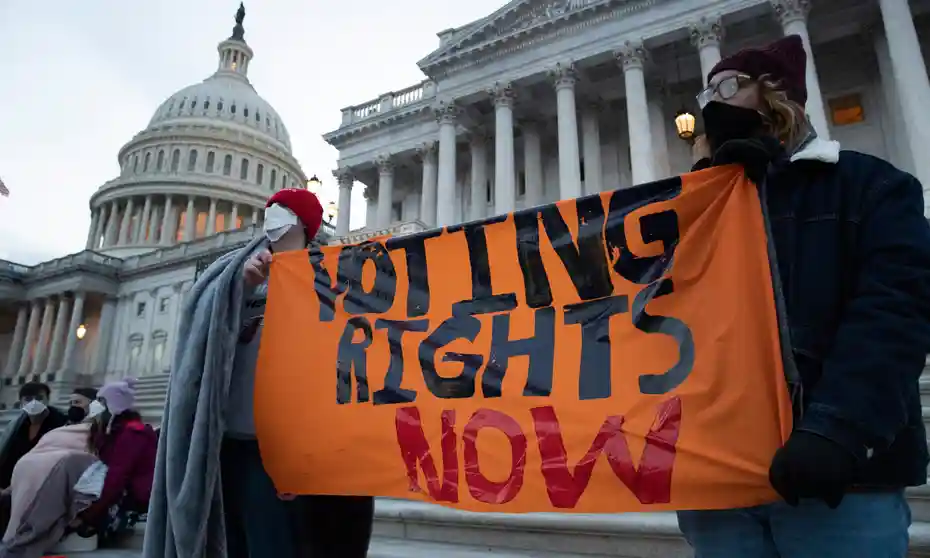Image Credit The Guardian
With the climate of the world today and the upcoming 2022 Federal Election, now more than ever, voters need to be aware of political issues and current legislation in the United States. During this midterm election year, all 435 seats in the House of Representatives, and 34 of the 100 seats in the Senate will be contested. This is important, because as of right now Democrats have control of the House, while Republicans control the Senate. After the midterm election this could change drastically, changing the status quo and challenging bipartisan issues.
Two extremely important bills currently up for debate in the Senate right now are the John Lewis Voting Rights Advancement Act and the Freedom to Vote Act. Democrats say these bills will make it easier for all Americans to vote, and reverse efforts by several states to limit ballot access. Both of these measures were approved by the House of Representatives, but face an “uphill battle” in the Republican controlled Senate.
The John Lewis Voting Rights Advancement Act is intended to reverse the 2013 Supreme Court decision that struck down key portions of the Voting Rights Act of 1965, which made it harder for states to discriminate against marginalized groups of Americans. The law required several states with a history of voter discrimination to get preclearance from the Department of Justice for any changes to voting laws. The Lewis Act would restore the requirement and update the formula used to determine which states need to get preclearance.
The Freedom to Vote Act reaches those on a much larger scale, and affects everything from the way congressional districts are drawn to how campaigns are financed. This is a huge deal because the bill would do a number of things that could potentially benefit voters:
- Election day would be made a national holiday, making it easier to get voters to the polls.
- States would be allowed to vote up to two weeks before Election day, including nights and weekends.
- Voting would be allowed by mail for all voters with no excuse needed.
- It would require states to make voting more accessible for people with disabilities.
- It would require states that need to see a voter’s ID when they cast their ballot to broaden the types of accepted identification. This means students eligible to vote could potentially use their school ID as a form of identification.
- States would have to offer same-day voting registration, online registration, and make it easier to register at places like the DMV.
- It would outlaw “partisan gerrymandering” which is essentially drawing congressional boundaries that give a political advantage in favor of one party or another.
- It would impose new rules for how campaigns are funded by requiring any group that spends more than $10,000 to influence an election to disclose all donors.
- The measure would also strengthen the Federal Election Commission’s ability to investigate charges of campaign abuse and require that states replace outdated voting machines with more modern ones that provide voters with a printed record of their ballots.
Democrats argue that passing these bills would prevent states from making it harder for people to cast their ballots, and bridge the gap of discrimination against voters. Republicans claim that many of the new laws passed are attempts to prevent voter fraud, and that the bills before congress amount to a federal takeover of what has previously been a state responsibility. President Biden is unsure if these bills will pass the Senate vote: “I don’t know that we can get it done,” he said. “As long as I have a breath in me, as long as I am in the White House, as long as I’m engaged at all, I’m gonna be fighting to change the way these legislatures have moved.”
The John Lewis Voting Rights Advancement Act and the Freedom to Vote Act are significantly influential bills currently being voted on by the Senate, and Americans need to be aware of these potentially life altering decisions. The Siskiyou urge students who are eligible voters to familiarize themselves with these issues and cast their vote in the upcoming 2022 midterm elections!



